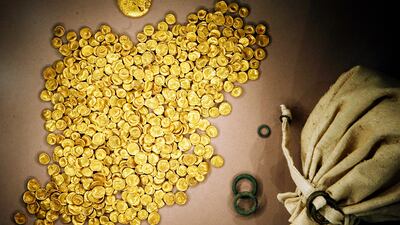Organised criminals orchestrated the theft of a hoard of hundreds of ancient gold coins from a German museum this week in a break-in that took only nine minutes to execute, a senior police officer said.
The perpetrator — or perpetrators — prised open a fire escape door into the Celtic and Roman Museum in the Bavarian town of Manching in the early hours, said the deputy head of state criminal police office, Guido Limmer.
The public prosecutor's office has opened an investigation into serious-incident gangland robbery. Germany has been plagued by crime gangs carrying out high-profile jewel thefts including the notorious Green Vault smash and grab in Dresden.
“It's clear that you don't simply march into a museum and take this treasure with you,” said Markus Blume, Bavaria’s minister of science and arts. “It's highly secured and as such there's a suspicion that we're rather dealing with a case of organised crime.”
Mr Blume said all of the museum's security systems, along with Manching's entire telephone network, had been disabled during the raid.
German news agencies reported that in addition to the 483 coins, dating back to around 100BC, three other items were stolen from another display cabinet.

Authorities fear the treasure, worth millions of euros, could be melted down, meaning the bowl-shaped coins would be lost to science forever.
The gold treasure is the flagship and most valuable exhibit of the museum, which opened in 2006 to showcase the largest Celtic gold hoard found in the 20th century.
The coins were discovered in 1999 on the site of the Manching settlement founded by Celts in the late La Tene period around 300BC. It was believed to have been inhabited until around 30BC and was probably the capital of the Celtic tribe of Vindeliker.
The settlement peaked in the mid-second century BC, when the first city wall was built and an estimated 5,000 to 10,000 people lived in Manching. Its end may have been heralded by the collapse of the northern Alpine economic system following Caesar's conquest of Gaul by 50BC. The Roman occupiers later founded a road station nearby, which they named Vallatum.
The coins were restrikes of a Greek coin shaped by Celtic tribes. The hoard also includes a 217g gold nugget. The commercial value of the items is estimated at around €1.6 million ($1.6 million). Mr Blume spoke of a treasure of "unique cultural and historical value".
One official said the theft was a "classic raid as you would imagine in a bad film". The loss of telephone and internet connections for 13,000 private and corporate customers around Manching on Tuesday night meant there was no alarm at the neighbourhood police station.


